App Development
Mobile application development is the process of designing and creating software applications that operate on mobile devices. Typically, these applications rely on network connectivity to interact with remote computing resources. The development process encompasses several key steps: building installable software packages (including code, binaries, and assets), developing backend services such as APIs for data access, and thoroughly testing the application on target devices to ensure optimal performance and user experience.
-min.png)
-min.png)
-min.png)

-min.png)
-min.png)
-min.png)